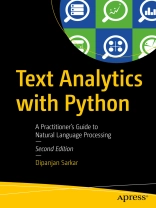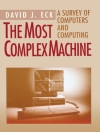Leverage Natural Language Processing (NLP) in Python and learn how to set up your own robust environment for performing text analytics. This second edition has gone through a major revamp and introduces several significant changes and new topics based on the recent trends in NLP.
You’ll see how to use the latest state-of-the-art frameworks in NLP, coupled with machine learning and deep learning models for supervised sentiment analysis powered by Python to solve actual case studies. Start by reviewing Python for NLP fundamentals on strings and text data and move on to engineering representation methods for text data, including both traditional statistical models and newer deep learning-based embedding models. Improved techniques and new methods around parsing and processing text are discussed as well.
Text summarization and topic models have been overhauled so the book showcases how to build, tune, and interpret topic models in the context of an interest dataset on NIPS conference papers. Additionally, the book covers text similarity techniques with a real-world example of movie recommenders, along with sentiment analysis using supervised and unsupervised techniques.
There is also a chapter dedicated to semantic analysis where you’ll see how to build your own named entity recognition (NER) system from scratch. While the overall structure of the book remains the same, the entire code base, modules, and chapters has been updated to the latest Python 3.x release.
What You’ll Learn
• Understand NLP and text syntax, semantics and structure
• Discover text cleaning and feature engineering
• Review text classification and text clustering
• Assess text summarization and topic models
• Study deep learning for NLP
Who This Book Is For
IT professionals, data analysts, developers, linguistic experts, data scientists and engineers and basically anyone with a keen interest in linguistics, analytics and generating insights from textual data.
Tabla de materias
Chapter 1: Natural Language Processing Basics.- Chapter 2: Python for Natural Language Processing.- Chapter 3: Processing and Understanding Text.- Chapter 4: Feature Engineering for Text Data.- Chapter 5: Text Classification.- Chapter 6: Text summarization and topic modeling.- Chapter 7: Text Clustering and Similarity analysis.- Chapter 8: Sentiment Analysis.- Chapter 9: Deep learning in NLP.
Sobre el autor
Dipanjan (DJ) Sarkar is a Data Scientist at Red Hat, a published author and a consultant and trainer. He has consulted and worked with several startups as well as Fortune 500 companies like Intel. He primarily works on leveraging data science, advanced analytics, machine learning and deep learning to build large- scale intelligent systems. He holds a master of technology degree with specializations in Data Science and Software Engineering. He is also an avid supporter of self-learning and massive open online courses. He has recently ventured into the world of open-source products to improve the productivity of developers across the world.
Dipanjan has been an analytics practitioner for several years now, specializing in machine learning, natural language processing, statistical methods and deep learning. Having a passion for data science and education, he also acts as an AI Consultant and Mentor at various organizations like Springboard, where he helps people build their skills on areas like Data Science and Machine Learning. He also acts as a key contributor and Editor for Towards Data Science, a leading online journal focusing on Artificial Intelligence and Data Science. Dipanjan has also authored several books on R, Python, Machine Learning, Social Media Analytics, Natural Language Processing and Deep Learning.
Dipanjan’s interests include learning about new technology, financial markets, disruptive start-ups, data science, artificial intelligence and deep learning. In his spare time he loves reading, gaming, watching popular sitcoms and football and writing interesting articles on https://medium.com/@dipanzan.sarkar and https://www.linkedin.com/in/dipanzan. He is also a strong supporter of open-source and publishes his code and analyses from his books and articles on Git Hub at https://github.com/dipanjan S.












